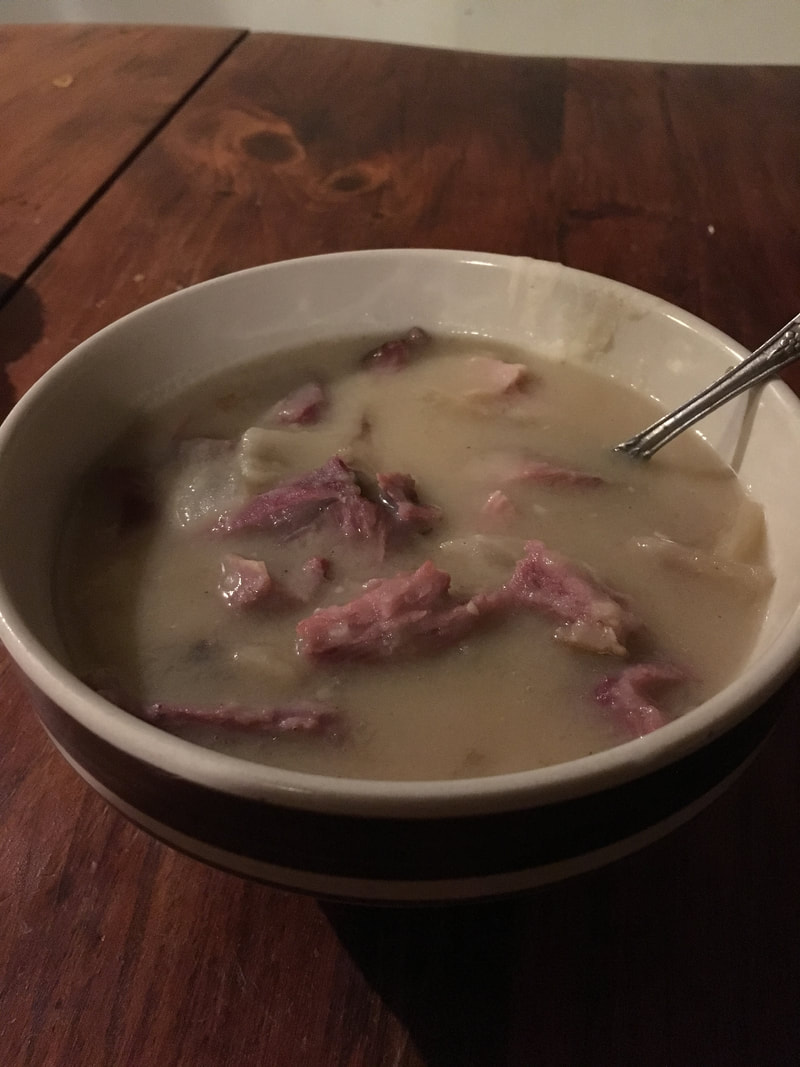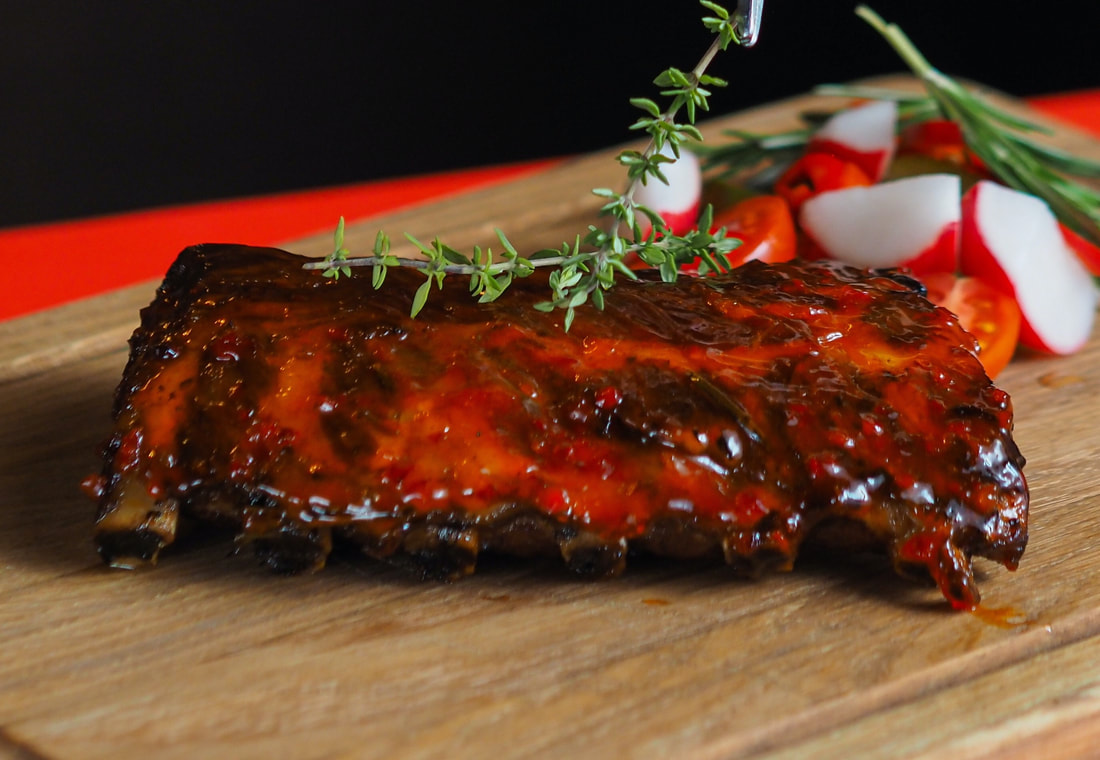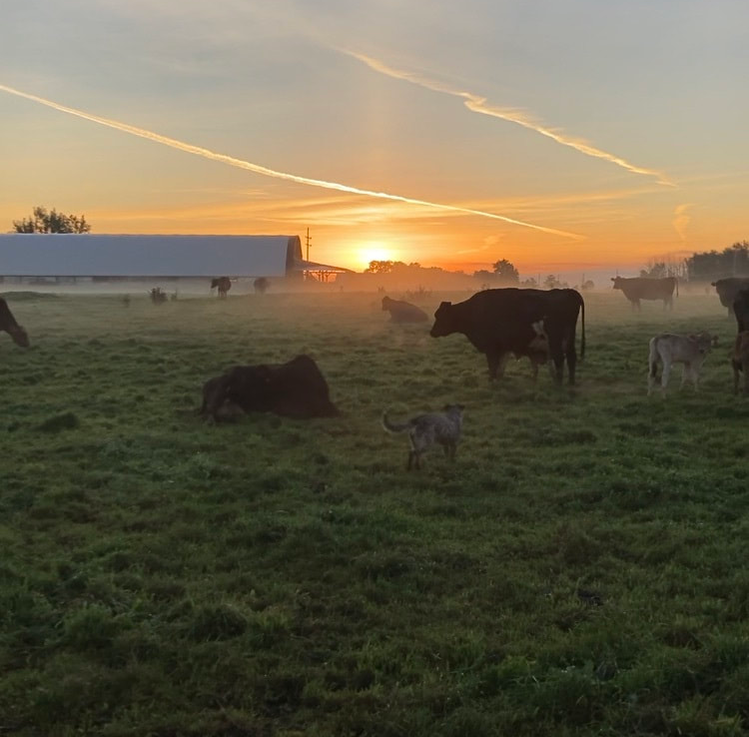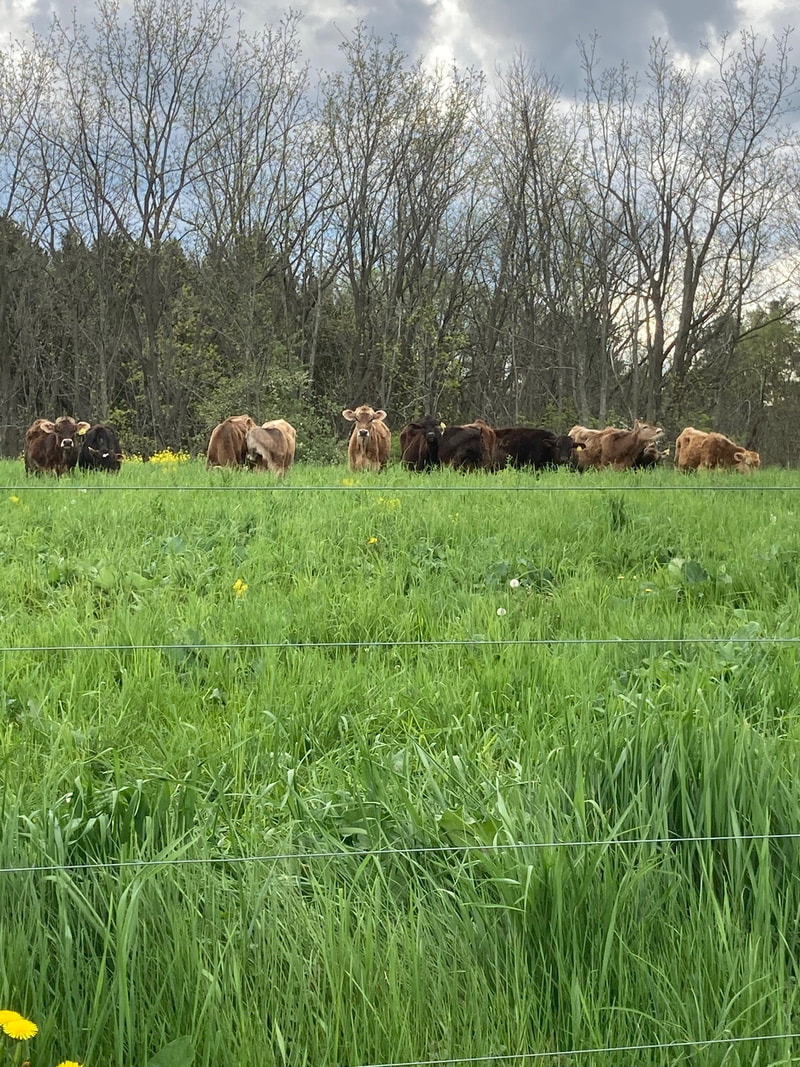|
Breakfasts aren't usually facncy in our house, but when they are, they still need to by easy! This dish takes only a few minutes to prepare (you can even cook the sausage ahead) and it's a hit with everyone, even for dinner! Enjoy!
These proportions work in a 9x13 pan, but you can easily cut the recipe in 1/2 for a 8x8 pan. Apple-Sausage Oven Pancake 1 package Crosswinds breakfast sausage links (about 1.25 lb) 2 C baking mix (OR: 2C flour, 3 tsp baking powder, 1/2 tsp salt, 2 Tbsp butter) 1 C Crosswinds whole milk 1 tsp cinnamon 2 Crosswinds eggs 1 C apple, peeled & chopped Real maple syrup 1.Preheat oven to 450F. Grease 9x13 baking pan. Brown sausages in skillet over medium heat, turning until evenly cooked throughout. 2. Mix baking mix, milk, cinnamon, and eggs until blended. Stir in apple. Pour into pan. Arrange sausage links on top. 3. Bake 20-25 minutes or until golden brown. Serve with maple syrup & a tall glass of ice cold milk!
0 Comments
If you want to stand outside in 0 degree weather and grill - you are way more of a Bills fan than me! But have you discovered how easy it is to make fantastic ribs right in your oven? Ribs always intimidated me until I learned this technique - now they come out perfectly every time! This will work for baby backs or spare ribs, whichever you prefer.
Here's what I do: 1. Preheat oven to 275. 2. Season the ribs to your liking. In our house it's usually just salt, pepper, garlic & onion - but if you have a favorite spice rub, now's the time to use it. 3. Place the ribs on a pan and cover with foil. Leave them in the 275 oven for about 2 hours. 4. Remove the foil and top the ribs with your favorite sauce, then slide under the broiler for about 5 minutes. 5. Let rest for just a minute - and voila - fabulous ribs in the middle of winter! It seems our world relies more and more on connectivity via the internet. We farm because we value connections, but not those involving technology.
Connections we have to our animals and land. Connections with the rhythms of life and weather and seasons that cycle endlessly. Connections with our heritage and ancestors who have farmed before us. Direct, strong connections with our customers who understand the importance of knowing the hands that have raised & crafted the food on their tables. Connections with our children whom we share this life with. These are connections that will transcend all the unrest our world is facing. They are connections that will prevail when many may take them for granted. Our life's work is to provide food for our community. We invite you to share in the power that strengthening our local food network creates for our future - all of our futures. We ask that you spread the word. Share your connection to us with your neighbor, your co-worker, your family member. Give them the opportunity to make these connections and source their nourishment direct from a farming family. Above all, food direct from the farm Just. Tastes. Better. 1 1/4 C honey
1/4 C soy sauce 8 cloves garlic, finely chopped 1 tsp ground black pepper 6 14oz pork chops kosher salt Bring honey, soy sauce and garlic to a boil in small saucepan, reduce heat to simmer for 5 min, until garlic is cooked. Remove from heat & whisk in black pepper. Set aside. Lightly salt chops. Heat grill to 450. Sear pork chops on all sides, turning frequently to develop a crust on all surfaces, about 7 minutes total. Lower the heat and cook through, continuing to turn, 15-20 minutes more. Cook until internal temp is 140. Brush the chops with honey garlic glaze, and serve with additional glaze. Recipe adapted from foodandwine.com. For Sale: Used SunshineUsed sunshine, huh? What the heck am I talking about?
Our farm philosophy is fairly simple: Use plants to capture solar energy. Use livestock to turn human-inedible plants into tasty, nutrient dense, dairy & meat products. Really, the stars of this system are the microbes that exist both in the soil and produce nitrogen, and in the cows' rumens (stomachs) that turn plant fibers into protein. Beyond this basic philosophy are a million logistical details that influence how the process is completed. Our management focuses on minimizing inputs onto the farm as much as possible. For the cows, that's only salt and minerals including selenium, which our soil in the Northeast is deficient in. We do need to harvest a good portion of our acres for winter feeding because of the layout of our farm, so there are inputs required to do that. Pigs are not ruminants; they have a simple stomach that functions the same as yours and mine. They don't have the benefit of rumen bacteria and therefore need more essential amino acids supplied in their diet. Their diet includes grain which is an input to our farm; we include excess milk & whey from our dairy which reduces the amount of grain required. Time on the tractor gives me a chance to catch up on podcasts, and lately I've been binge listening to "Working Cows", a podcast focused on all things related to regenerative farming & ranching with livestock. I believe it was Steve Kenyon in episode 95 that said farmers and ranchers are one of two things: used sunshine salesmen, or earth miners. If you're not taking full advantage of soil and rumen biology, you're either depleting soil nutrient reserves or need to add nutrients in the form of fertilizers, most of which are petroleum derived. We'd prefer to manage our soils, grass, and livestock in ways that allow us to focus on being used sunshine salesmen! We think you can taste the difference, as well as reaping the health benefits of nutrient dense foods! Tis the season for Pork Carnitas – the Mexican version of pulled pork! Our pork shoulder roasts are perfect for this tasty dish and if you've never tried them you're missing out! Our roasts have a thick fat cap which will render out as you’re cooking it low & slow, keeping the meat moist & juicy. Traditional carnitas are deep fried in lard, but if you use a cooking vessel close to the size of your roast, you can accomplish the same outcome without adding any lard. I love this explanation behind the science of this cooking technique! (PS We also offer rendered lard if you'd like to try the authentic technique!)
The key to carnitas is crisping up the pork after shredding it – you can do this in a frying pan or under the broiler. Serve carnitas as tacos, enchiladas, burritos, over rice or on a salad. They store well refrigerated or frozen (before crisping) and used as needed! Rather than reinvent the wheel, here are links to recipes I can recommend: this one uses an oven, and this one offers options for slow cooker or insta pot! Enjoy! Is sourcing your meat from a local farm that ethically raises animals important to you? Are you overwhelmed by the options and not sure what will work best for you? Let me help you sort this out!
First, answer these questions: 1. How much meat does my household prepare on a daily/weekly/monthly basis? Every household has unique habits and needs! Determining both how many meals per week typically include meat, and how much meat at each meal, will give you a rough idea how long a bulk purchase might last you. Are you cooking for 1 or 2, or 6 or 8? And are those teenagers (aka bottomless pits) or seniors with smaller appetites? Does one pound of ground beef make one meal plus leftovers for a second, or will you need two pounds to get everyone fed tonight? 2. How much freezer space can I dedicate to meat storage? The freezer of a typical fridge/freezer can easily hold any of our CSA shares, or one of our 20lb bundles, in addition to a “normal” variety of other frozen items. If you’d like to try ordering a ¼, ½ or whole animal, more freezer space is necessary. Chest/upright freezers can be a great investment, especially if you also want to store fresh fruits or produce harvested in season. You can often find them used on Craigslist or Marketplace, though I’m wary of any that are more than 10 years old (likely limited lifespan and less energy efficient). Try to choose a size freezer that you will fill at least once a year – freezers are most efficient when they are full! Another option is to rent freezer space as needed. The Ithaca Meat Locker (http://ccetompkins.org/agriculture/buy-local/local-meats/the-meat-locker) offers lockable bins for $3-5/month. Our local grocery store also offers the same service – check into what might be available in your community! 3. How fussy is my household about the cuts of meat we cook with? Do you only like to cook with your tried & true favorite cuts, or are you open to trying new things? Both our CSA shares and 20 lb bundles include an element of surprise – you do not have complete control over the items you receive. Both DO include staples including ground beef, bacon, and sausage, but the balance of the order will vary. They’re a great opportunity to experiment, perhaps learn a new technique for a new recipe, and push outside your comfort zone on occasion! You can also plan your meals around the meat cuts you receive, rather than having to plan everything from a blank slate. In contrast, each ¼, ½ or whole animal purchase is cut specifically for your order, so you can choose exactly the items you receive. However, you receive the cuts in proportion to how many are in one animal. There’s only so much bacon & so many steaks in each animal. Your order will also include parts like the shoulder and rump. There’s flexibility in how these parts are processed – they can be cut as roasts, less common steaks, or ground for more sausage/ground beef. You need to be willing to cook with all of the cuts (in some form) or you’ll soon find you’ve used all of the bacon and still have 7/8 of a pig in your freezer! 4. Can my budget handle larger, infrequent outlays for stock-ups, or do I need to purchase on a weekly/monthly basis? Ordering a ¼, ½ or whole animal is a one-time purchase that will range from $325 to $2400, but because you’re buying a large volume it’s the most cost effective way to purchase our meats. We offer these options every 2-3 months, so you can plan your purchase in advance, perhaps to coincide with a time that you have more cash available (like your tax return!) . We also gladly accept EBT or credit cards. Teaming up with a friend, neighbor, or family member is another great option for capturing bulk pricing while making the cash outlay and freezer space requirement smaller. Our CSA shares are a 6 month commitment, which can be paid up front or in monthly installments, making it easier to budget evenly. Our freezer bundles are a one-time purchase with no ongoing commitment, and can be ordered anytime! Just how much is a ½ pig or ¼ beef? A ½ pig is roughly 60 lb of meat for your freezer, and might look like 6 lb bacon, 15 lb ham/ham steaks, 10 lb shoulder roasts/steaks, 15 lb chops/loin roasts, 8 lb sausage, 3 lb ribs, 1 lb hocks, 2 lb heart/liver (or more cuts can be ground for more sausage). You’ll need 3-4 cubic feet of freezer space for a 1/2 pig. Double these numbers for a whole pig. Our beef vary more in size from animal to animal but 150lb is a typical hanging weight for a ¼ for our farm. This might be 35 lb ground beef and/or patties, 10 lb chuck roasts/steaks, 5 lb stew beef, 5 lb soup bones, 4 lb brisket, 10 lb premium steaks, 5 lb sirloin, 10 lb round/rump roasts/steaks, 4 lb short ribs, 4 lb organs. (This is just an example – you choose how it’s cut!) You’ll need about 5 cubic feet of freezer space for a ¼. Double for a ½, double again for a whole beef! To summarize: if you have freezer space and the ability to make larger, less frequent purchases, stocking up with a ¼, ½ or whole animal is the most cost effective way to purchase local meat. You can place a reservation for pork or beef today! If your freezer space is limiting, our monthly CSA shares divy that purchase up into smaller deliveries. Or, if you’d prefer to not make a monthly commitment, you can order a 20lb bundle whenever it’s convenient, or you can pick and choose by the cut from our current inventory! Hopefully these questions have helped you think about your households’ eating & buying habits and will help you to make the meat purchases that suit you best!  Creamy Potato and Ham Hock Soup Creamy Potato and Ham Hock Soup What the Heck is a Hock? If you’ve ever studied our product list and wondered “what exactly is a hock?”, this post is for you! One of the benefits of sourcing food directly from the farmer is that we offer access to nearly every part of the animal, including things you might not find in most stores. Hocks are the joint on the rear leg of the pig. Sometimes called ham hocks or pork knuckles, they’re adjacent to the shank and then the ham (the rear end of the pig). Hocks have a good amount of meat attached to bone, so perfect for slow cooking to release the collagen. Because the hock is a joint, there’s a lot of connective tissue, which needs to be cooked low & slow to tenderize. The moist, tender meat is covered in a tasty layer of fat & skin. We generally offer them smoked, which brings a delicious flavor to your table. Hocks star in traditional dishes of many different cultures, but here are two basic recipes to get you started. What's your favorite way to prepare hocks? Hocks & Beans 1 lb dry beans of your choice (pinto, navy, etc). 1 large smoked ham hock (or 2 small) 1 large onion, finely chopped 2 cloves garlic, minced 2 diced red chili peppers (optional) 1 tsp salt ¼ tsp black pepper
10 C chopped potatoes 2 lb smoked ham hocks 2 C chopped yellow onion 1 C chopped celery 3 cloves garlic, minced 2 ½ tsp salt 1 tsp black pepper 5 C water or broth 1 C heavy cream
When you open your freezer, are you met with an ice-covered abyss of unidentified objects?
Does the thought of “stocking up” on anything scare you because you’ll have to make more space? Not sure what you should meal plan because you don’t know what’s left in there? Whether your freezer is just ½ of a typical fridge, or you have the largest chest you could find, keeping it under control will make your life better! This hit home last time we returned from the butcher with two truckloads of meat! Our fleet is seven chest and upright freezers, plus the freezers of two extra refrigerators, and keeping track of what’s where, how much inventory we have left, and GETTING IT ALL IN is no easy feat! No lies, I consider myself something of a pro at freezer jenga. Here are 5 tips to make life with a freezer more enjoyable:
Hopefully these tips will help you keep the Abominable Freezer Monster under control – and make stocking up an easier option! |
AuthorI'm half of the Crosswinds farmer duo bringing you farm fresh cheeses, beef, and pork from the heart of the Finger Lakes! Stay tuned for our daily adventures growing a family & a farm, and food for your table. We welcome your questions & comments, but please keep them respectful! For the latest updates, please follow Crosswinds Farm & Creamery on Facebook or Instagram! Archives
March 2024
Categories |
Our Location |
|





 RSS Feed
RSS Feed